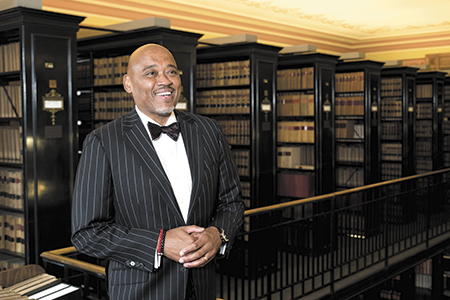Subscriber Benefit
As a subscriber you can listen to articles at work, in the car, or while you work out. Subscribe NowTony Prather’s legal career has included a full-service labor and employment practice with significant trial experience. He also served two terms on the Indiana Supreme Court Disciplinary Commission and has received honors for his community service efforts. Prior to joining Barnes & Thornburg, he served as in-house counsel for companies including Ameritech and Firestone.
 What was your most memorable job before becoming an attorney?
What was your most memorable job before becoming an attorney?
My most memorable job before I became a lawyer was my employment by Indiana University as a resident assistant my junior and senior years. That job was memorable because it forced me out of my comfort zone and required me to interact with people on a daily basis whose life experiences and views of campus life were significantly different than my life experiences and views of campus life.
When did you first decide you would become a lawyer, and what motivated you?
I decided that I wanted to become a lawyer as a freshman at Pike High School. Ice Miller partner Harry Gonso spoke to my business law class and I was so intrigued by his description of what he did that I decided in that day that I wanted to be a lawyer.
Who is someone who inspired or mentored you, and what did you learn from them?
I have been truly blessed with too many personal and professional mentors to list them, and I would not be either the man or lawyer I am today without those individuals in my life. That being said, my first inspiration/mentor was my mother. She raised my sister and me by herself without any financial support from my father and taught me from an early age, via her actions and not her words, to not waste time complaining about the cards that life dealt me and instead, to focus on working hard, treating other people the way that I wanted to be treated, and keeping God in my life.
What’s been the most rewarding aspect of your practice?
Being recognized by my peers as being knowledgeable in my area of practice and as a strong advocate on behalf of my clients, but one that does so trying to promote civility in the practice of law.
What are some of your proudest achievements in your community service work?
The community service work that I am most proud of is the time spent over a number of years mentoring high school, college and law students. My proudest achievements in this area of community services occur whenever a former mentee reaches out to me, typically years after our mentoring relationship ended, and shares with me how the time we spent positively impacted both their personal and professional lives.
What do you most enjoy doing when you’re not in the office?
Spending quality time with my wife Marti and my now grown kids Brandon, Alexandria, Dominic and Grant Prather. Ideally, on an island somewhere in the Caribbean.
What are some of the things you learned serving on the Disciplinary Commission?
I spent 10 years as a member of the Indiana Supreme Court’s Disciplinary Commission and the list is too long to explain all that I learned with serving on the Disciplinary Commission. That being said, the following “lessons learned” stand out in my memory:
1. the importance of periodically reviewing both the Indiana Rules of Professional Conduct and the Comments;
2. the importance of helping lawyers in the first five years of their practice understand the importance of periodically reviewing both the Indiana Rules of Professional Conduct and the Comments; and
3. how dedicated the Executive Director and his staff of attorneys were in protecting the interests of the general public.
What advice would you give your younger self?
To enjoy the journey that has been my 34-plus years of practicing law. I spent the vast majority of this journey focused on the next phase of my practice and what I needed to do to get there and spent too little time enjoying the successes of the journey.
What’s something about you not many people know?
I hate flying.
What has been your most memorable case?
Three cases stand out in my memory as significant professional achievements. While I cannot get into the details because of client confidentiality issues, all three cases started with me advising clients with respect to difficult decisions that needed to be made with respect to employee compensation and/or discipline issues. In each case, the clients followed my advice and ultimately, the employees/former employees filed charges of discrimination with the EEOC and sued my clients. In all three cases, I successfully defended the clients before the EEOC; successfully defended the clients in federal district courts and successfully defended the clients in appeals before the Seventh Circuit Court of Appeals.
How do you see the legal profession changing in the next decade?
I recognize that the profession is premised on confrontation between two competing views regarding a particular issue. Ideally, I hope to see the practice and interactions between lawyers become less confrontational and more congenial.
How has the practice of law changed since you became a lawyer?
When I first started practicing law in 1983, we did not have computers or cellphones. In the 34-plus years since I started practicing law, computers and cellphones have changed the way that we practice law and changed expectations. Unfortunately, in today’s practice of law, employers, peers and clients expect access 24 hours a day, seven days a week. Those expectations, in my opinion, make the practice of law more stressful.•
Please enable JavaScript to view this content.
